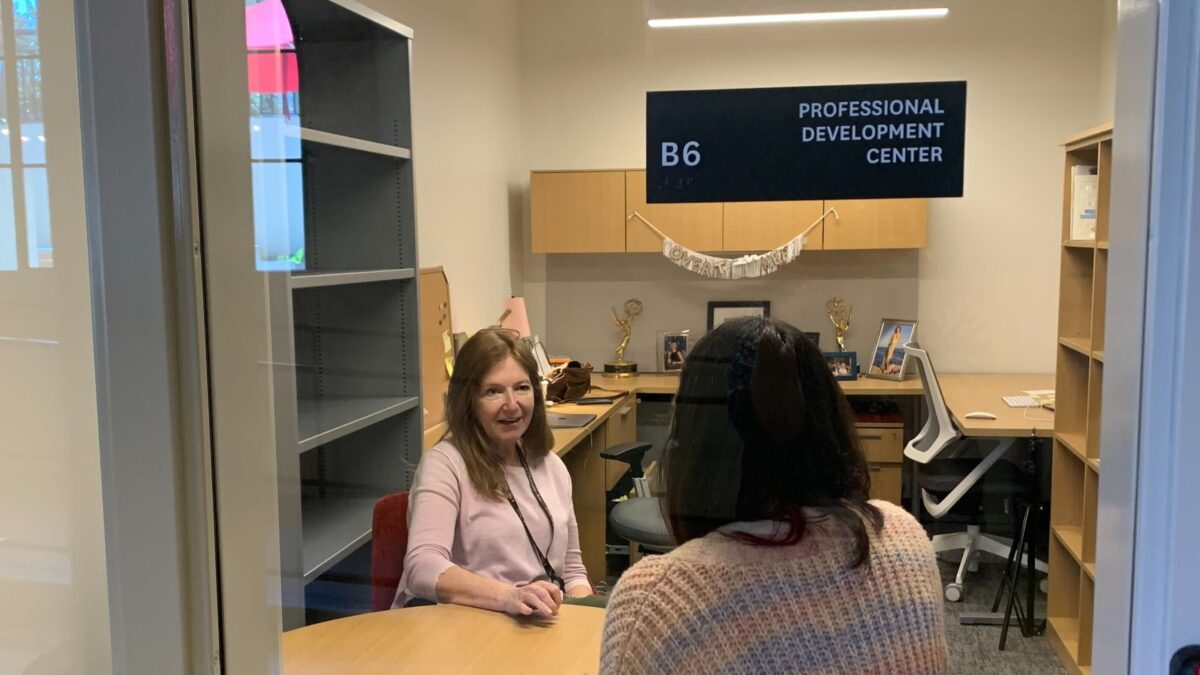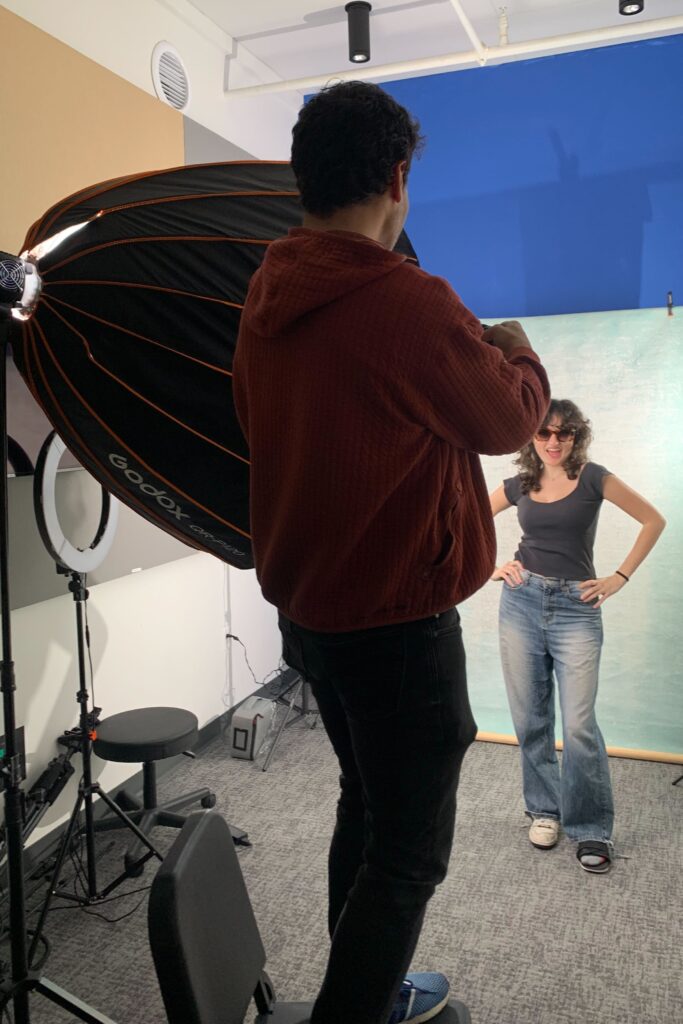
Emmy-winning casting director Debi Manwiller, Director of USC School of Dramatic Arts' Professional Development Center, provides personalized career guidance to a student. Photo by SDA Communications
The entertainment industries continue to evolve at a rapid pace, with new platforms and opportunities emerging alongside traditional pathways. For dramatic arts students navigating this changing landscape requires both artistic excellence and professional savvy.
At the USC School of Dramatic Arts (SDA), the Professional Development Center stands as a pioneering response to this need. “Professional preparation isn’t just a practical consideration—it’s a moral imperative,” says SDA’s Dean Emily Roxworthy, “and it’s what distinguishes our approach from other theatrical training institutions. We’re committed to ensuring that students have the tools to translate their artistic talents into sustainable careers.” As the only career development program of its kind in the nation at a dramatic arts school, the center provides comprehensive services to help students transition confidently from the classroom to the industry.
Comprehensive Career Resources
Here are some of the services offered:
- Free headshots taken in the center by professional photographers, with guidance on shot-selection by a casting industry veteran
- Access to the center’s self-tape studio that has a blue screen, professional lighting, videographers and readers
- A twice-a-month email newsletter with audition notices, summer stock openings, internships and other opportunities
- Invitations to workshops organized by the center on topics such as contracts, video game voiceover work, motion capture work, and acting in commercials
- Unlimited sessions of one-on-one career advice with the center director
- Audition coaching sessions with faculty members for juniors and seniors
- Professional residencies for some students throughout Los Angeles
- Faculty help assembling video highlight reels
- A mentor matching service for seniors, pairing them with an industry professional who meets with them monthly in their last semester and after graduation
Founded in 2017 by SDA faculty member Dan Shaner (who directed it for seven years), SDA’s Professional Development Center moved into a new, expanded physical space in the renovated Dick Wolf Drama Center building in 2024, and this academic year welcomed a new director: Debi Manwiller, a two-time Emmy winning casting director with decades of experience in television, film and theatre.

Manwiller is a sounding board for students unsure about their futures and a provider of practical advice about the industry. She demystifies the idea of waiting for a big break, instead urging students to prepare for success by making the most of their time at USC.
She tells them: “You are in a world class institution known for its connectivity and alumni relations, and you are surrounded by incredible professors all across the board. There’s excellence everywhere at USC and so much to select from.
“Look around. There are a lot of very smart, driven people here. They may not all be actors, but writers, or a producer or a publicist or costume designer. You are going to run into these people again. You are coming up with these people and you need to develop your spiderweb, your network.”
She urges students to participate in all they possibly can and not worry about getting an agent right away. Most college students don’t have representation when they graduate, she notes, and it is not a barometer of whether they are going to be successful or not.
Building Networks for Success
“You came here to study, to work on your craft,” she tells them. “Be in productions. Experiment. Take a standup class. Try something you’re not good at. Participate. You have to have your finger in more than one pie, several pies, to cover yourself. SDA’s website is all about multi-hyphenates, and it’s true. You can’t just be one thing any more. The ones who have longevity have reinvented themselves more than once.”
Manwiller is direct, full of industry knowledge, adept at bringing in professionals with other specialties, and alert to emerging technologies and opportunities, such as YouTube verticals, short videos designed for mobile devices. “You don’t know what the next thing will be and how it will be monetized and perhaps turned into something else,” she says. She advises students to be open to all kinds of entertainment platforms.
“The industry is more fractured than it ever was, but at the same time, it’s exciting. It’s the Wild West. We’re going to continue to consume entertainment, but how we’re going to consume it, where we’re going to consume it and the forms it will take are going to change.”
Manwiller is the voice of experience when she cautions students against putting too much pressure on themselves or measuring themselves against another’s success, a process she calls “compare and despair.”
“I try and take away the pressure they put on themselves that is unrealistic. Take that rock out of your backpack! Our industry is not a linear path. It’s going to look a little different for everybody.
“You never know where the holes are in somebody’s roster and they need a 7-foot basketball player who can speak Mandarin,” she says. “Those things are out of your control—You have to make peace with that part of it. That’s the mental health aspect of success.”
Preparing for Industry Realities
Manwiller notes that the center aims to provide a bridge not only to the industry but to adulting. She urges students to provide a structure to their days when they graduate, have a clear-eyed vision that it might take a while before they make enough to support themselves with entertainment work, and to look for a survival job that is creative.
In her own life, she graduated with a theatre degree from CalArts, and after acting for a while and being successful at temp jobs, she interned in a friend’s casting office. Realizing how creative the casting process can be, she gave herself permission to change her career goal from acting to casting.
“What do I like about it? It’s like when you read a novel and if the writing is good, you can picture it in your head: the places, the people, what they look like and sound like. So when I read a script, it’s in my head. I like bringing a world to life. That part of it is really exciting. And I love actors. I appreciate what they do. It’s much harder than it looks, and not everyone can do it.”
The Academy of Motion Picture Arts and Sciences is recognizing the importance of casting with a new Academy Award for casting that will be part of the 2026 Oscars.
One of the biggest changes in the industry is that casting is now primarily done virtually, making it difficult to build relationships with the directors and producers actors previously would meet face to face. That’s why SDA’s Professional Development Center’s mentorship program for graduating seniors is invaluable, Manwiller says. “Having someone’s brain you can pick, that’s golden.”
What’s also golden is for SDA students to have an industry insider like Debi Manwiller, a dedicated space and targeted programs to help them start a career. These robust, curriculum-enhancing professional programs are vital to students’ long-term success in an ever-changing industry, and exist solely through the generosity of donors who support the USC School of Dramatic Arts’ commitment to comprehensive artist training.